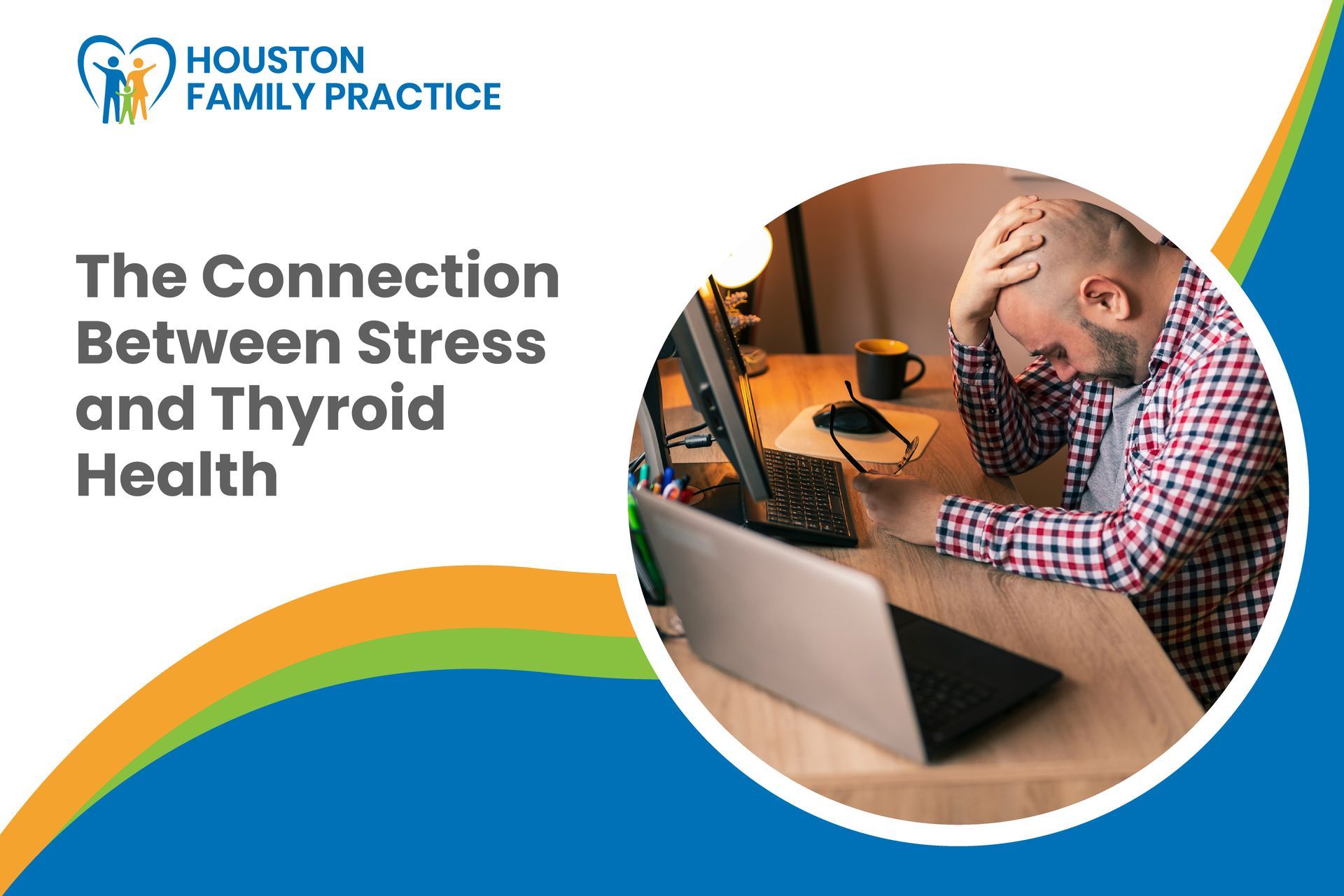The Connection Between Stress and Thyroid Health

The word "stress" seems to be used far too frequently in today's modern world. The body's natural response to unsafe or damaging situations is stress. Being stressed in moderation is not that bad. It can stimulate your body's fight-or-flight reaction.
Excessive stress, on the other hand,
can harm both your mental and physical health. When you ask, “can stress cause thyroid problems?” This blog post will answer the question: "can stress cause thyroid problems?" Continue reading to learn more.
What are Stress and Thyroid Gland?
Here are the definitions of stress and the thyroid gland for better understanding.
Stress
- is any transformation that causes physical, emotional, or psychological pressure. Stress is your body's
reaction to anything that requires your attention or action.
Everybody suffers from stress to a certain level. The way you
respond to stress, on the other hand, has a significant impact on your general well-being.
The thyroid gland -
is a little
butterfly-shaped gland near the base of the neck. Thyroxine (T4) and triiodothyronine (T3) are the two primary hormones produced by the thyroid gland (T3). These thyroid hormones are crucial in the
regulation of your weight and metabolism.
How Can Stress Cause Thyroid Issues?
The thyroid gland works with the
adrenal glands. The adrenal glands are situated on top of each kidney. When you're stressed out, your adrenal glands typically make
cortisol. Cortisol speed up body processes and slow down metabolism, which helps the body deal with stress.
Cortisol, on the other hand, inhibits the function of the pituitary gland, which is essential for the production of the
thyroid-stimulating hormone (TSH). The TSH helps your thyroid gland
release T4 and T3 hormones.
When the TSH level drops, the thyroid gland stops working. This is called
hypothyroidism. Hypothyroidism happens when triiodothyronine (T3) and thyroxine levels drop significantly (T4). In addition, the body cannot convert T4 into T3, which leads to elevated amounts of reverse T3 in the blood.
So, how else can stress affect your thyroid? When stressed, you are more likely to develop autoimmune thyroid disease,
Hashimoto's thyroiditis.
Moreover,
hyperthyroidism is also a thyroid problem, but it is not caused by stress. But that doesn't mean that stress and hyperthyroidism are not connected in some way. If you already have hyperthyroidism symptoms, physical or mental stress can make them worse.
How Can Hypothyroidism Cause Anxiety?
Hypothyroidism is a condition that can make you
feel tired, make you gain weight, and change your mood, so it's not surprising that it can be linked to stress or anxiety. This tells us that thyroid stress is possible.
A
study indicated that people with thyroid dysfunction have a higher prevalence of anxiety and mood problems. Anxiety and hypothyroidism are connected here.
Learning About the Thyroid Problem Caused by Stress
Physical stress often triggers thyroid storms, a condition that manifests as thyroid problems. It is a potentially fatal condition that develops in specific individuals with uncontrolled hyperthyroidism and
Graves' disease.
The most typical cause of a thyroid storm is a physically stressful event, such as the following:
- Infection
- Heart attack
- Childbirth
- Diabetes
- Hyperthyroid treatments such as surgery and radioiodine therapy
A thyroid storm is a very uncommon but life-threatening illness requiring prompt medical intervention. Symptoms include the following:
- Severe fever
- Excessive perspiration
- Rapid and erratic heart rate
- Anxiety and apprehension
- Tremors or trembling
- Diarrhea
- Emesis and nausea
- Seizures
- Delirium or confusion (mental impairment)
5 Stress-Relief Techniques for Improved Thyroid Management
Both stress and hypothyroidism can cause symptoms, some of which include increased body fat, exhaustion, and mood changes.
People with chronic diseases such as hypothyroidism, which can be badly influenced by stress, should pay extra attention to their stress management practices. A holistic strategy that includes healthy food, physical activity, sleep, and giving time to relax is ideal.
1. Take Some Time to Relax
Spending time to
think or meditate can help relax the body and avoid stress. In the end, relaxation will lead to less stress, affecting your thyroid less.
There are many different ways to chill down. Taking part in creative activities like knitting or crocheting can be relaxing for some people. For some people, all that is required is some simple, fresh air, while others need yoga or deep breathing techniques.
Give your body the fuel it needs by practicing relaxation techniques. You can help restore balance to your overall health and your thyroid.
2. Adopt a Balanced Diet
It would help if you took a diet that will
ease stress. This will also help you feel and stay healthy.
- Food in lean proteins
- Whole grains
- Dairy products with low fat
- Healthy fats like avocado and olive oil.
- Vegetables
- Fruits
Observe proper portion control and limit (or prevent) the consumption of saturated fats, processed carbohydrates, salt, added sweets, and alcohol.
3. Be Active
Regular physical activity is an excellent
stress reliever that can improve your energy and attitude. Exercise can also improve your sleep and lessen weariness. This is
especially helpful for persons suffering from fatigue due to hypothyroidism. However, before beginning any fitness regimen, consult with your doctor.
4. Get Enough Sleep
Fatigue can be
caused by hypothyroidism, but it can also be caused by
not getting enough quality sleep. The racing thoughts that might result from stress can make it hard to get a good night's sleep. Seven to nine hours of quality sleep will make you feel better and reduce tension.
The National Sleep Foundation advised keeping your bedroom
cold, dark, and comfortable. It is best to engage in a calming bedtime routine and maintain a consistent schedule for going to bed and getting up, especially on the weekends, to enhance the quality of your sleep.
5. Seek Help
Working through your issues verbally or
leaning on someone you know and trust for support can help you make tough decisions and better manage stress. Social and emotional support can come from various people and places, including but not limited to: family, friends, a therapist, a support group, coworkers, coaches, and religious institutions.
When you are in a position where you require assistance, please do not hesitate to ask for it. Talking to someone will
significantly reduce your stress levels and make it easier to manage your hypothyroidism.
Ask Your Doctor for Assistance
If you’re looking for a “doctor near me” or “healthcare clinics in Houston, Texas,” look no further. We offer quality care for the whole family at
Houston Family Practice.
Our medical staff at Houston Family Practice is knowledgeable and well-trained in caring for patients with stress that leads to other diseases, such as thyroid issues. To book an appointment, call us today at 713-520-6016.











